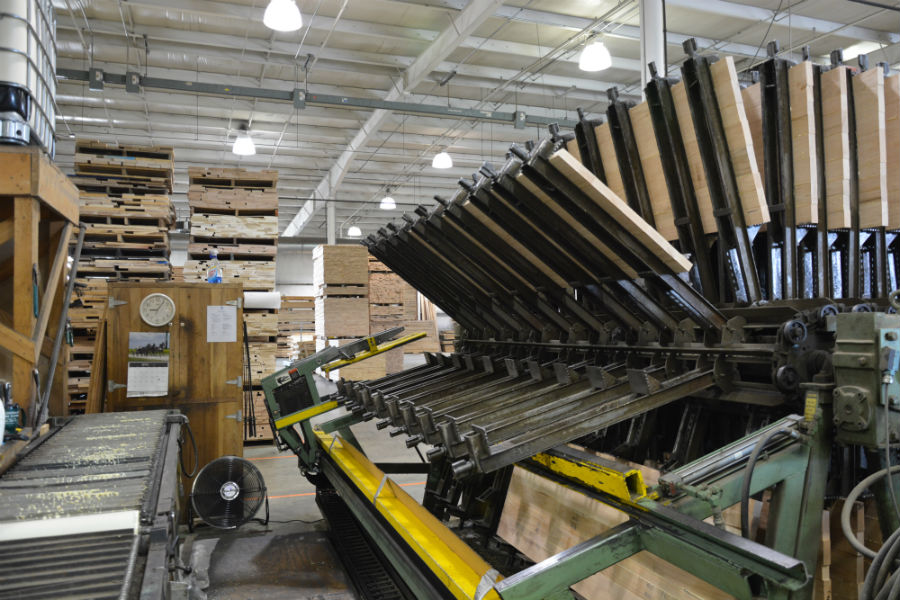But lean isn’t just about reducing cost in one division or area; it’s a philosophy that should carry through the entire business or organization, whether producing goods or services. Companies like Toyota, John Deere, and Caterpillar have implemented Lean by making more efficient use of time, eliminating non-value-added activities, and improving morale though better staff engagement and policies. The methodology of Lean Manufacturing has helped us here at Yoder Lumber in Millersburg, Ohio to develop and implement numerous process improvements since 2014. For example, we’ve been able to double the total output of our dual automated glue clamp while feeding two glue clamps with our Opti-Match color-matching machine by Cameron, a division of Taylor Manufacturing. Conveyors have reduced our reliance on lifts, offering better response times from lifts throughout the plant. The total cost of these improvements has been significantly lower than the price of an additional glue clamp, and the total amount of floor space we’re using for our clamps has not increased, but our production certainly has.
There’s another aspect to Lean Manufacturing some might not be aware of—Six Sigma. I'd like to take a moment to talk about Six Sigma and why it’s of importance to us here at Yoder Lumber.
Let me start by explaining the name—Six Sigma. In statistics, “sigma” is another word for a “standard deviation,” which is simply a representation of how a group of numbers is spread out. The statistical representation of Six Sigma describes quantitatively how a process is performing. According to iSixSigma, it’s a disciplined, data-driven approach and a measure of quality that strives for near perfection. To achieve Six Sigma, a process must not produce more than 3.4 defects per million opportunities. A Six Sigma defect is defined as anything outside of customer specifications. A Six Sigma opportunity is then the total quantity of chances for a defect.
To put it plainly, one “sigma” would be a percentage of the pieces within a certain distance from the average. An example would be if we took a random sample of 100 pieces of lumber sawed on one of our sawmills and then measured each piece for thickness. Upon doing so, we’d probably have a range of thicknesses which would (hopefully!) average nearly exactly the thickness we intended to produce per customer specification. Not only that, but, ideally, none of these pieces would vary too far from that thickness goal. If we would see a variation of, say, three-eighths of an inch above of below our ideal thickness, that would obviously be a bad outcome for both us and for the customer.
Variation is the key to understanding Six Sigma. Some companies have decided that their processes will produce “Six Sigmas” of products that fall within acceptable quality limits. That means that for every one million products a process produces, there shouldn't be any more than 3.4 defects! This is obviously as close to perfect as anyone could expect, and it is a goal that’s exceptionally difficult to achieve. That said, there are businesses capable of meeting or even exceeding this Six Sigma standard.
Yoder Lumber will continue to focus on improving quality. We're proud of what we do here, but we are also humble enough to admit that there are many opportunities for us to improve our mindset, our processes, and our product. While Lean Manufacturing often requires significant training and investment, every company and organization can immediately implement policies that can go a long way toward increasing quality and customer satisfaction. A few examples would be holding back product that doesn’t meet our high-quality standards or addressing issues, practices, or equipment that consistently cause quality problems. These policies and procedures don’t cost a thing and can actually save time in the long run. All quality issues have a root cause, and the sooner that root is addressed, the sooner the problem can be eliminated.
While we'd love to see it happen, Yoder Lumber does not expect to achieve a Six Sigma standard in the near future. As much as we like to push for efficiency and throughput, what we greatly emphasize is the absolute necessity to improve QUALITY. Products that need reworked require a lot of extra time and outside resources. Even more damaging are poorly manufactured products that could be shipped to our customers who would then see them as a poor reflection on our products and services as a whole. A stitch in time, as they say, saves nine. In the end, this kind of careful attention to detail just might gain loyal customers, too.
By Tony Yoder
Hardwood Components Manager









